Tradiţional şi european în codificarea naţională a dreptului internaţional privat
Traditional and European in national codification of private international law
Author(s): Dan Andrei PopescuSubject(s): Law, Constitution, Jurisprudence, Civil Law
Published by: Universul Juridic
Keywords: national PIL codification; choice of law rule; private international law;
Summary/Abstract: In these pages, we set out to highlight some novel aspects of the national codification of private international law, contained in Book VII of the Romanian Civil Code. More specifically, we referred to issues related to the method, what can be considered an innovation of the Civil Code compared to previous regulations. In this regard, we analyzed in detail the concept of habitual residence of the person as the main factor of its legal integration. Habitual residence is, in many matters, both an attributive factor of international competence and, equally, an element of determination of the applicable law. The impact of European law in this area, including the jurisprudence of the CJEU and national courts, has been analyzed. The establishment of a person's habitual residence cannot disregard his presence in a particular national territory. The duration and regularity of the stay, its purpose, social integration, as well as any other circumstances and circumstances from which the person's intention can reasonably be determined to establish his or her place of interest in that place must, of course, be taken into account. In the case of newborns, the requirement of physical presence in a certain territory should not be considered in the absolute way. Thus, if the birth of the child took place in a random place (following a trip or following a prior agreement with the other parent), the child's habitual residence is generally in the country of habitual residence of both parents (of the family), before the mother moved. Therefore, in principle, the habitual residence of newborns coincides with that of their family; it cannot be left to the discretion and unilateral will of the child's mother, even if, due to the child's age, he is naturally in a state of accentuated dependence on it. The place of birth is, in most cases, an indication, an element that can be taken into account in determining the habitual residence of the infant, but is not, in itself, a decisive, ultimate, intrinsic and inherent criterion of his habitual residence. Last but not least, we analyzed the impact of the exception clauses, introduced for the first time in the national codification of private international law, their role in correcting the legal proximity fixed by the play of choice of law rules.
Journal: Revista Română de Drept Privat
- Issue Year: 2021
- Issue No: 3-4
- Page Range: 177-214
- Page Count: 38
- Language: Romanian
- Content File-PDF

